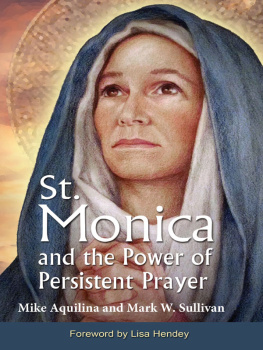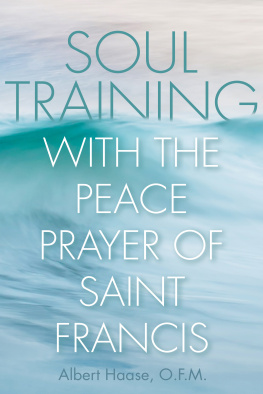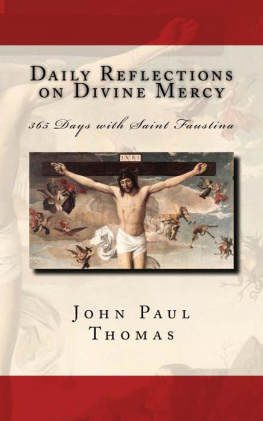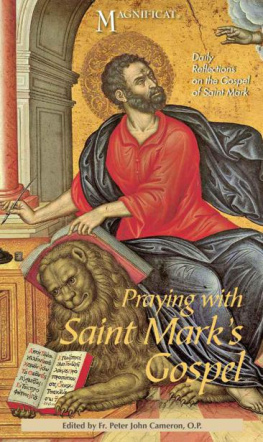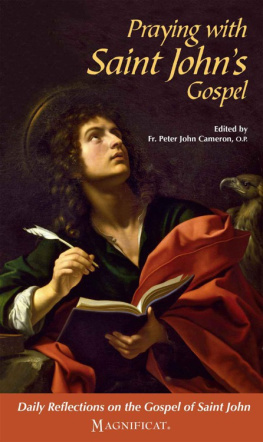Edmonds Rosemary - On Prayer: Reflections of a Modern Saint
Here you can read online Edmonds Rosemary - On Prayer: Reflections of a Modern Saint full text of the book (entire story) in english for free. Download pdf and epub, get meaning, cover and reviews about this ebook. year: 2020, publisher: Saint Vladimirs Seminary Press, genre: Religion. Description of the work, (preface) as well as reviews are available. Best literature library LitArk.com created for fans of good reading and offers a wide selection of genres:
Romance novel
Science fiction
Adventure
Detective
Science
History
Home and family
Prose
Art
Politics
Computer
Non-fiction
Religion
Business
Children
Humor
Choose a favorite category and find really read worthwhile books. Enjoy immersion in the world of imagination, feel the emotions of the characters or learn something new for yourself, make an fascinating discovery.

- Book:On Prayer: Reflections of a Modern Saint
- Author:
- Publisher:Saint Vladimirs Seminary Press
- Genre:
- Year:2020
- Rating:3 / 5
- Favourites:Add to favourites
- Your mark:
- 60
- 1
- 2
- 3
- 4
- 5
On Prayer: Reflections of a Modern Saint: summary, description and annotation
We offer to read an annotation, description, summary or preface (depends on what the author of the book "On Prayer: Reflections of a Modern Saint" wrote himself). If you haven't found the necessary information about the book — write in the comments, we will try to find it.
On Prayer: Reflections of a Modern Saint — read online for free the complete book (whole text) full work
Below is the text of the book, divided by pages. System saving the place of the last page read, allows you to conveniently read the book "On Prayer: Reflections of a Modern Saint" online for free, without having to search again every time where you left off. Put a bookmark, and you can go to the page where you finished reading at any time.
Font size:
Interval:
Bookmark:

On Prayer
Reflections of a Modern Saint
Saint Sophrony (Sakharov)
Translated from the Russian by
Rosemary Edmonds
st vladimirs seminary press
yonkers, new york
Copyright 1996
Patriarchal Stavropegic Monastery of St John the Baptist
Tolleshunt Knights by Maldon, Essex

st vladimirs seminary press
575 Scarsdale Road, Yonkers, NY 10707
1-800-204-2665
www.svspress.com
isbn 978-0-88141-678-7
All Rights Reserved
PrayerAn Ever-New Creation
P rayer is infinite creation, far superior to any form of art or science. Through prayer we enter into communion with him that was before all worlds. Or, to put it in another way, the life of the Self-existing God flows into us through the channel of prayer. Prayer is an act of supreme wisdom, of all-surpassing beauty and virtue. Prayer is delight for the spirit. But the circumstances accompanying this creative work are complex. Time after time we experience an eager upsurge towards God, followed repeatedly by a falling away from his Light. Time and again we are conscious of the minds inability to rise to him. There are moments when we feel ourselves on the verge of madness. Pain forces the cry, Thou didst give me thy precept to love, which I accept with all my being, but there is no strength in me for this love. Thou who art love, come and abide in me, and perform in me all that thou hast enjoined, for thy commandment exceeds my powers. My mind is too frail to comprehend thee. My spirit cannot see into the mysteries of thy life. I desire to do thy will in all things but my days go by in perpetual conflict. I am tortured by the fear of losing thee because of the evil thoughts in my heart; and this fear crucifies me. I sink. Lord, save me, as thou didst save Peter who dared to walk on the water to go to thee (cf. Mt 14.2831).
At times prayer seems over-slow in bringing results, and life is so short. Instinctively we cry, Make haste unto me. But he does not always respond at once. Like fruit on a tree, our soul is left to scorch in the sun, to endure the cold wind, the scorching wind, to die of thirst or be drowned in the rain. But if we do not let go of the hem of his garment, all will end well.
It is vital to continue in prayer for as long as we can, so that his invincible strength may penetrate us and enable us to resist every destructive influence. And with the increase of this strength in us comes the joy of hope in final victory.
Prayer assuredly revives in us the divine breath which God breathed into Adams nostrils and by virtue of which Adam became a living soul (Gen 2.7). Our spirit, regenerated by prayer, begins to marvel at the sublime mystery of being. The mind is filled with wonder. Being, how is it possible? And we echo the psalmists praise of the wondrous works of the Lord. We apprehend the meaning of Christs words, I am come that [men] might have life, and that they might have it more abundantly (Jn 10.10). More abundantlythis is indeed so.
But again and again I find myself reflecting that life is full of paradox, like all the gospel teaching. I am come to send fire on the earth; and what will I, if it be already kindled? (Lk 12.49). All we sons of Adam must go through this heavenly flame that consumes our deathly passions. Otherwise we shall not see the fire transformed into the light of new life, for it is not light that comes first, and then fire: in our fallen state burning must precede enlightenment. Let us, therefore, bless the Lord for the consuming action of his love. We do not know altogether but we do at least know in part (1 Cor 13.9) that there is no other way for us mortals to become children of the resurrection (Lk 20.36), children of God, to reign together with Christ, the only-begotten Son of God. However painful this re-creating may be, however it may distress and laceratethe process, agonizing as it is, in the end will be a blessed one. Erudition requires prolonged and intense labor but prayer is incalculably harder to acquire.
When the gospels and epistles become real for us, we see how nave were our former notions of God and life in him. The Wisdom that is revealed to us far surpasses mans imaginingEye hath not seen, nor ear heard, neither have entered into the heart of man, the things which God hath prepared for them that love him (1 Cor 2.9). Even a whisper of the Divine Spirit is glory beyond compare to all the content of life lived apart from God.
True prayer uniting us with the Most High is nothing other than light and strength coming down to us from heaven. In its essence it transcends our plane of existence. This world contains no source of energy for prayer. If I eat well so that my body may be strong, my flesh will rebel against prayer. If I mortify the flesh by excessive fasting, for a while abstinence favors prayer, but soon the body grows faint and refuses to follow the spirit. If I associate with good people, I may find moral satisfaction and acquire new psychological or intellectual experience, but only very rarely will I be stimulated to prayer in depth. If I have a talent for science or the arts, my success will give rise to vanity and I shall not be able to find the deep heart (cf. Ps 64.6), the place of spiritual prayer. If I am materially well-off and busy wielding the power associated with riches or with satisfying my aesthetic or intellectual desires, my soul does not rise up to God as we know him through Christ. If I renounce all that I have and go into the desert, even there the opposition of the cosmic energies will paralyze my prayer. And so on, ad infinitum.
True prayer to the true God is contact with the Divine Spirit which prays in us. The Spirit gives us to know God. The Spirit draws our spirit to contemplation of eternity. Like grace coming down from on High, the act of prayer is too much for our earthly nature and so our mortal body, incapable of rising into the spiritual sphere, resists. The intellect resists because it is incapable of containing infinity, is shaken by doubts, and rejects everything that exceeds its understanding. The social environment in which I live is antagonistic to prayerit has organized life with other aims diametrically opposed to prayer. Hostile spirits cannot endure prayer. But prayer alone can restore the created world from its fall, overcoming its stagnation and inertia, by means of a mighty effort of our spirit to follow Christs commandments.
The struggle for prayer is not an easy one. The spirit fluctuatessometimes prayer flows in us like a mighty river, sometimes the heart dries up. But every reduction in our prayer-strength must be as brief as possible. To pray not infrequently means telling God of our disastrous state: of our weakness and despondency, our doubts and fears, the melancholy, the despairin brief, everything connected with our condition. To pour it all out, not seeking to express it elegantly or even in logical sequence. Often this method of approach to God turns out to be the beginning of prayer as communion.
Sometimes we shall lie afloat in a sea of divine love, which in our imagination we interpret one-sidedly, as our love for him. It was like that with meI did not dare think that the infinitely great Creator of all things could heed my worthless, vile self. And I would cry, Oh, if only thou couldst love me as I love thee... Dost thou not see how my heart thirsts for thee day and night? Incline unto me. Show me thy countenance. Make me such as thou dost desire to see them that thou hast createdsuch as thou, All-holy One, may receive and love... I did not know what I said (cf. Lk 9.33). I did not dare think that it was he himself praying in me.
Font size:
Interval:
Bookmark:
Similar books «On Prayer: Reflections of a Modern Saint»
Look at similar books to On Prayer: Reflections of a Modern Saint. We have selected literature similar in name and meaning in the hope of providing readers with more options to find new, interesting, not yet read works.
Discussion, reviews of the book On Prayer: Reflections of a Modern Saint and just readers' own opinions. Leave your comments, write what you think about the work, its meaning or the main characters. Specify what exactly you liked and what you didn't like, and why you think so.

